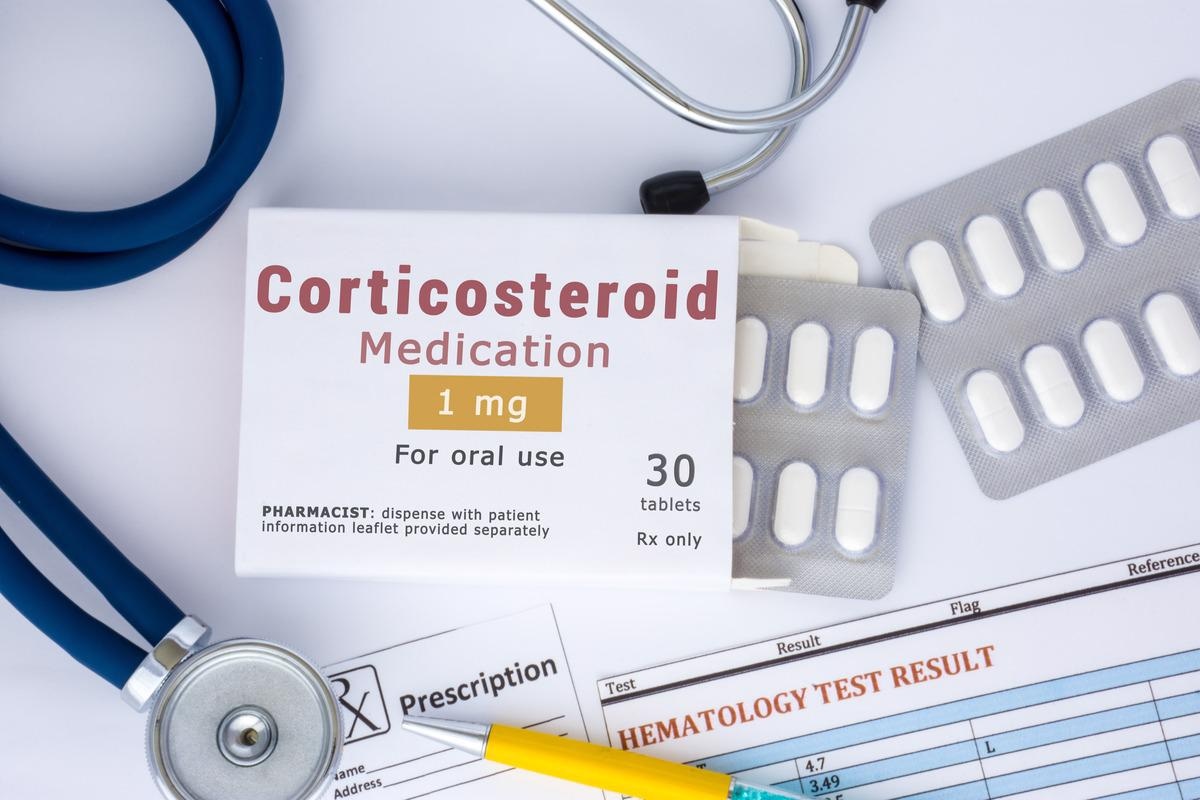Corticosteroids have been advised as a drug to target the host immune response in patients affected with severe lung inflammation due to coronavirus disease 2019 (COVID-19). This treatment has been beneficial in reducing the mortality rate significantly. Corticosteroids have been in use for over 70 years and have shown some benefits in the treatment of viral pneumonia and acute respiratory distress syndrome.

Image Credit: Shidlovski/Shutterstock
What are Corticosteroids?
Corticosteroids are a class of hormones produced by the adrenal glands. These hormones affect fat, protein, and carbohydrate metabolism and have anti-inflammatory and immunosuppressive properties. Some naturally occurring corticosteroids are cortisol, corticosterone, cortisone, and aldosterone. Synthetic drugs are created which mimic the effects of these natural corticosteroids, some of which are dexamethasone, prednisone, and prednisolone.
Why use Corticosteroids in COVID-19 Patients?
The causative agent of COVID-19, severe acute respiratory syndrome coronavirus 2 (SARS-CoV-2), is a single-stranded RNA virus. It contains spike proteins on its surface, which help the virus to bind and fuse with the cell membrane. When the highly pathogenic SARS-CoV-2 enters the epithelial cells of the lungs, an inflammatory response is induced.
Following this, macrophages and dendritic cells are activated due to the release of the inflammasomes. The disease progresses to severe lung inflammation when the epithelial cells of the lungs are damaged by the inflammatory response or the invasion of the virus. Research suggests that controlling this inflammatory response could lower lung damage significantly.
Corticosteroids are routinely used to treat various inflammatory disorders and autoimmune diseases; this makes it an ideal drug to treat severe lung inflammation in COVID-19 patients.
The RECOVERY Trial
The Randomised Evaluation of COVID-19 Therapy (RECOVERY Trial) is a large-scale trial that began in March 2020 in the United Kingdom. This randomized controlled trial is an open-label trial; where the participants and clinicians know which drug is being administered.
The RECOVERY trial aimed to assess the role of several drugs which could lower the mortality rates in severe COVID- 19 patients. One of these drugs that had a breakthrough was dexamethasone, a corticosteroid.
As of September 2021, more than 43,000 patients participated in the RECOVERY trial at more than 180 sites. It is the biggest trial globally that tests drugs for COVID-19 patients.
In this trial, 2104 patients were allocated administration of 6mg of dexamethasone once daily for ten days, and 4321 patients were to receive regular care without dexamethasone. After 28 days, the results showed a significantly lower mortality rate in the patients who received dexamethasone. Among COVID-19 patients under ventilator support, deaths were reduced by one-third. And one-fifth among patients who were using supplemental oxygen. There was little to no benefit for severe COVID-19 patients who were neither using a ventilator nor supplemental oxygen.
Furthermore, patients who underwent dexamethasone as a part of their treatment were discharged earlier than the usual care group. Additionally, they had a greater probability of being discharged alive after 28 days. Also, the risk of progression to ventilator support in the patients receiving dexamethasone was reduced.
This trial has been of global importance in assessing the role of the low-cost corticosteroid, dexamethasone, in treating severe COVID-19. In the USA, the National Institute of Health has suggested the use of dexamethasone. Other countries which approved its use are Japan, Taiwan, and South Africa
Based on the RECOVERY trial, WHO released guidelines on using corticosteroids for COVID-19 patients in September 2020. Dexamethasone is also on the WHO List of Essential Medicines and is a readily available, low-cost drug.
Limitations of Corticosteroids
In the recovery trial, no benefits of dexamethasone were noted on the COVID-19 patients who did not require supplemental oxygen.
The effect of corticosteroids on non-hospitalized COVID-19 patients was not assessed. Therefore, corticosteroids cannot be suggested for use in outpatients due to insufficient data.
Furthermore, the administration of corticosteroids can cause several adverse effects. Typical adverse effects are hyperglycemia, psychological effects, hypertension, and fluid retention. Since corticosteroids are immunosuppressants, their usage can lead to secondary infections.
Uses of Other Corticosteroids
Dexamethasone has been widely used based on the RECOVERY trial, but some other corticosteroids have also shown benefits in COVID-19 patients. One such corticosteroid is hydrocortisone; it is typically used to manage septic shock in COVID-19 patients.
Two other open-label trials have studied the effect of inhaled budesonide on patients with mild COVID-19 symptoms. The result of this trial suggests that the usage of inhaled budesonide can reduce the recovery time and may even lower the chances of emergency care or hospitalization. Although promising, the research on the usage of inhaled budesonide is limited, and the results should be adapted with caution.
Conclusion
The Recovery trial has been groundbreaking research. The use of dexamethasone in severe COVID-19 patients has saved thousands of lives worldwide. Although the use of corticosteroids does have some limitations and adverse effects, many more trials are underway. Despite widespread mortality, research on COVID-19 drugs has shown immense progress in such a short time.
References:
- RECOVERY Collaborative Group, Horby, P., et al. Dexamethasone in Hospitalized Patients with Covid-19 – Preliminary Report. N Engl J Med. 2020:NEJMoa2021436. https://doi.org/10.1056/NEJMoa2021436.
- COVID-19 Treatment Guidelines Panel. Coronavirus Disease 2019 (COVID-19) Treatment Guidelines. National Institutes of Health. Available at https://www.covid19treatmentguidelines.nih.gov/. Accessed [01.10.2021].
- Annane, D., (2021). Corticosteroids for COVID-19. Journal of Intensive Medicine. Volume 1, Issue 1. Pages 14-25. https://doi.org/10.1016/j.jointm.2021.01.002.
- Coronavirus disease (COVID-19): Dexamethasone. (2020). World Health Organisation.https://www.who.int/emergencies/diseases/novel-coronavirus-2019/question-and-answers-hub/q-a-detail/coronavirus-disease-covid-19-dexamethasone
- Bansal, P., et al.(2021). Corticosteroid Adverse Effects. StatPearls Publishing. https://www.ncbi.nlm.nih.gov/books/NBK531462/
Further Reading
- All Coronavirus Disease COVID-19 Content
- The COVID-19 Pandemic: What have the experts learned?
- What Mutations of SARS-CoV-2 are Causing Concern?
- COVID-19: A Timeline From 1st Case to Vaccination
- What is COVAX?
Last Updated: Jan 19, 2022

Written by
Akanksha Singh
Akanksha has studied Dental Surgery from Bangalore, India. During her undergraduate degree, she was awarded the Best Student in Academics in 2016 and obtained University ranks in Microbiology and Pathology, and Conservative Dentistry.
Source: Read Full Article
